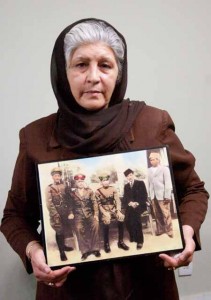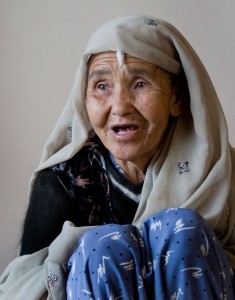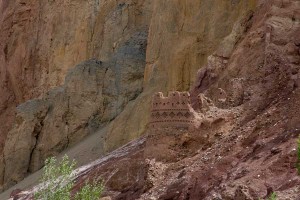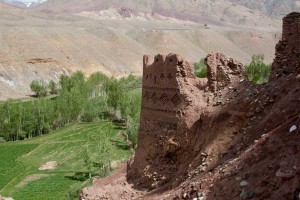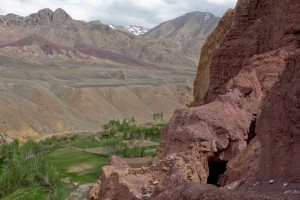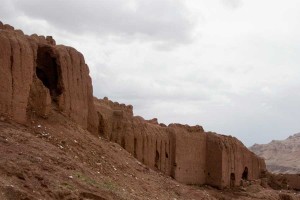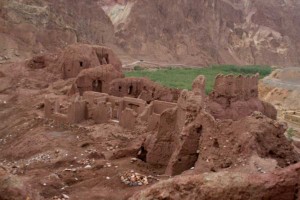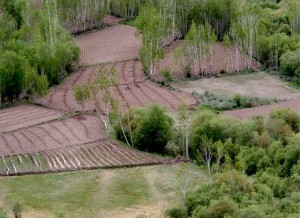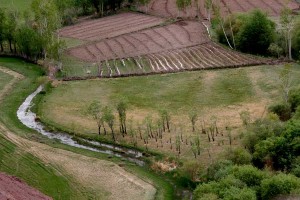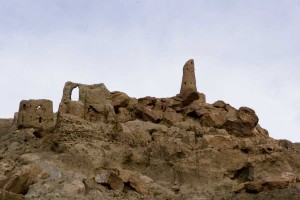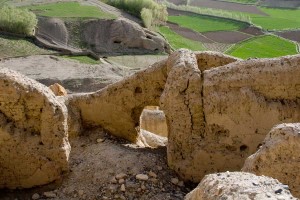AWP 2010
« Older EntriesMeeting Malalai
Tuesday, December 4th, 2012
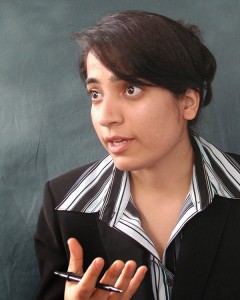 When I heard that Malalai was touring the US, I flew to Sonali Kolhatkar’s (author of Bleeding Afghanistan) California home where the young Afghan would be staying, to meet her. When Malalai walked into living room she seemed quiet and shy but once we began the interview, she became animated and energetic.
When I heard that Malalai was touring the US, I flew to Sonali Kolhatkar’s (author of Bleeding Afghanistan) California home where the young Afghan would be staying, to meet her. When Malalai walked into living room she seemed quiet and shy but once we began the interview, she became animated and energetic.
Malalai is most famous for her short speech as an elected member of the constitutional Loya Jerga (2003), when she addressed the elephant in the room that Afghans were already cognizant of and asked, how Afghanistan could become a democracy when there were warlords and criminals in the government. The audience erupted into angry chaos and her three-minute allotted speaking time was cut short after only a minute and a half. Angry lawmakers threw empty water bottles at her and shouted insults and death threats. Supporters and UN security forces gathered around to shield her. She was only 24 at the time. I met her during her first tour of the United States in 2006, after she had been elected as one of 249 Members of Parliament. Her outspokenness got her in trouble there as well and a year and two months later she was banned from that institution also.
At first, I wondered why she didn’t bite her tongue and try to work peacefully to make changes in the laws affecting women. Surely, that would be a more effective way to change women’s lives. Why stir the hornet’s nest? But then I realized that she wasn’t speaking to the other MPs, who already knew the situation, but to the international press and development leaders who were ready to pour billions in to Afghanistan’s reconstruction. They, too, were likely aware of the horrific human rights records of some of the MPs, but Malalai’s speaking out made that awareness public.
Malalai is also important because she’s a voice from a region across the country from Kabul. Most non-embedded reporters work from Kabul and investigate stories from there. Their view, the dominant one in the media, comes from that perspective and it’s very helpful to hear the voice of someone from conflict areas, especially a woman’s voice.
There is more of my interview with Malalai as well as with other Parliamentarians and women from all walks of life in my book, Gathering Strength: Conversations with Afghan Women which is available in many online bookstores as well as my publisher’s site, Pomegranate Grove Press.
****
Peggy Kelsey created the Afghan Women’s Project and in 2003 and 2010 traveled to Afghanistan to photograph and interview women. She shares her dynamic slide presentations with audiences around the world. Her book, Gathering Strength: Conversations with Afghan Women, came out in October, 2012.
Posted in Afghan Women's Project, Afghanistan, AWP 2010, Links, Other, Peggy Kelsey, Uncategorized, women | Comments Off on Meeting Malalai
Writing: Gathering Strength: Conversations with Afghan Women
Sunday, September 30th, 2012
Gathering Strength, my book of conversations with Afghan women, is published! I will have books in my hands by October 8th and on Amazon sometime around early November. (email me if you want me to send you a copy before November.) The writing process has taken nearly two and a half years but really, Gathering Strength is the culmination of ten years with The Afghan Women’s Project including two trips to Afghanistan.
It’s been over a year since my last post. I couldn’t tear myself away from writing and editing to write about the book. Now it’s the end of an era of narrow focus with a workaholic intensity.
When I started working on Gathering Strength I never imagined that I was capable of creating a work this profound and this beautiful. Of course it wasn’t all, or maybe even mostly my doing. Editing, layout and cover design have shaped this book into a form worthy of the Afghan women who shared their thoughts and stories with me.
From my last day in Afghanistan in May 2012, when I realized that I needed to and could write a book, I only knew that that I’d need an editor and that I would self-publish so I could maintain control over the material and the timing of publication. As I worked, I found that this book had a life and timing of its own and all I could do was to work as hard as I could (in a way balanced for the long haul) and be open to what came my way. Realizing that probably kept me from going crazy while trying to select from the myriad publishing and other options and it helped me be patient with my unrealistic imagined timeframe.
Thankfully, during the writing and editing, when I awoke in the mornings, I was driven out of bed to begin the day’s writing, a much different experience from the resistance I’d felt during past writing efforts. By the end I couldn’t wait for the writing/editing to be completed, but I never felt it to be drudgery.
As I wrote my early drafts, I dreamed of handing over the manuscript to someone who would transform it into a finished book for me; a knight in shining armor. Oh, well, that didn’t happen. Instead, I worked closely with my editors, going back and forth over different points, sometimes changing my mind, sometimes not. It felt good to have the last word.
The transition from writing and managing my book project to putting it out into the world has been difficult. I suddenly find myself procrastinating and being distracted by the many different fronts I have to engage. Hopefully, soon, I will find my stride. Frequent posting in this blog is one of those new efforts.
I’ll end this post with a quote from the only writer in Gathering Strength, Roya. She says:
I’m going to change my life and think differently. I’m going to experience the things that are my right. I have to show my sisters, my friends, my family, and Afghan women all over the world that we can change if we have a chance.
Posted in Afghan Women's Project, AWP 2010, Other, Peggy Kelsey, Uncategorized, writing process | Comments Off on Writing: Gathering Strength: Conversations with Afghan Women
Suraia Perlika
Thursday, March 3rd, 2011
You will be able to read about the further exploits of Tajwar in my book which is scheduled to be out in January of 2012. Her life story is the story of the “freedom fighters” as she called them.
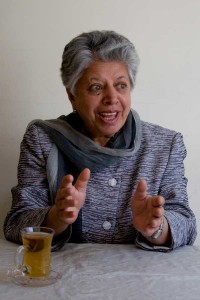
I’m now working on Suraia Perlika’s life story which tells of another woman also working for women’s rights and education, but from the Comunist side. She was one of the founders of the Democratic Women’s Organization which was supported by the Communists and also used as propaganda by them to show how much they’ve improved the lives of Afghan women. Ultimately, they imprisoned Suraia and put her on the “death list” but at the last minute she was pardoned by a rival Communist faction who had just come to power. She revived the Democratic Women’s Organiation as the Afghan Womens’ Union and gave herself the made-up name, Suraia Perlika.
Posted in Afghan Women's Project, AWP 2010, education, Other, Peggy Kelsey, political, Suraia Perlika, women | Comments Off on Suraia Perlika
Tajwar Kakar Part 1, Birth Story plus 2011 Update
Sunday, January 9th, 2011
I’ll begin 2011 with the amazing birth story of Tajwar Kakar, a woman I met on my trip in 2003 and again this past spring. I’d love to see her life portrayed on the big screen.
Tajwar Part 1 Birth Story
In 1948, Tajwar’s soon-to-be father was commissioner of the border between the Soviet Union and Afghanistan. The Russians* had gotten control of the Amu Darya River, also known as the Oxus, which runs along the northern side of Afghanistan, and were trying to make the border on the Afghan side of the river. “My father didn’t let them,” Tajwar told me. Six times before, Afghans had tried to negotiate a mid-river border, but had failed. “My father was brought from his post in Farah Province to meet with King Zahir Shah and head up the delegation. Before he left, my grandmother told him that my mother was pregnant. He told my mother that it doesn’t matter whether this child is a girl or a boy, but ‘if I get the river from Russia then it will be a lucky child for me. If I lose this river and Russia makes the border inside Afghanistan, this will be an unlucky child and I never want to see its face.'”
“So every time my grandmother prayed she would say ‘Allah, please help that man. This is an innocent child. When he says he will do this he will because he‘s a very strong Pashtun.’ My grandmother prayed every day that my father would get the river back. On the same day I was born he won back the river.”
“When he got the river he called to his people and told them to bring my child to the border. My grandmother said that I was too young but some people came and made a basket from branches and some very nice cloth. I was put inside and they took off for the border. More than 5000 people followed. When I arrived, my father put me in the boat and we went out into the river where he gave me the name Tajwar which means crown.”
“When he got back to Kabul, my father warned the king about Russia’s intention to invade Afghanistan and of his cousin, Daoud’s intention to help bring it about. Mr. Kakar was ignored, but his sympathies became known within the palace.”
“We moved to Kunduz when I was nine. Two years later, my father was poisoned by Daoud’s people because he was a powerful man and he didn’t support the Russians.”
*Tajwar always referred to the Soviets as Russians, but there were many Soviet troops from Kazakhstan as well as the other satellite states in addition to the Russians.
UPDATE
It’s been months since I’ve updated my blog. But with a new year comes a new determination to be more present in this space. 2010 brought my second Afghan Women’s Project trip to Afghanistan and its subsequent six months of interview transcription and image processing. Finally, my new presentation, Afghanistan 2010, a View from the Ground was crafted and debuted.
2011 will be the year of writing my book on the subject as well as giving presentations throughout the country. In addition to commentary on issues, I will be posting here in this blog elements from the book plus reviews of books pertaining to Afghanistan that I’ve read. And I resolve to post more regularly.
Posted in Afghan Women's Project, AWP 2010, education, Other, Peggy Kelsey, Tajwar Kakar, Uncategorized, women | Comments Off on Tajwar Kakar Part 1, Birth Story plus 2011 Update
Sunday, November 7th, 2010
It’s been a long time since I last posted. I’ve been very busy, focused on preparing the photo exhibit which will accompany my presentation, Afghanistan, 2010, a View From the Ground here in Austin on Nov. 19th at Ventana Del Soul in Austin. (78741)
Now I’m to the point of proofing the images and working on the word panels containing each woman’s bio and an excerpt from her interview that will accompany each of 25 portraits. This stage of the process has been gratifying and revelatory as I get a chance to step back from the mass of images and words and look deeply into individual eyes and take in their messages.
For example, I see the strength and determination in Habbiba‘s face while I read about the death threats she received during her time living in a Pakistani refugee camp. She and her sisters had started an informal school for bored young kids who were acting out but elders in the camp threatened to kill her if they didn‘t stop. She also started a small business in the camp, bringing in items from the bazaar in Peshawar to sell, which earned enough money to enable her and her family to move out.
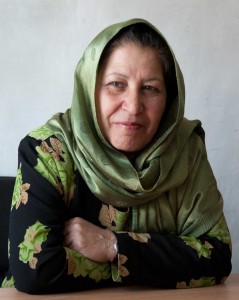
And there is the forthright look and single purpose of Rohina, who at 11 years old, is solely focused on her dreams of becoming a doctor and leading her family out of its hand-to-mouth poverty.
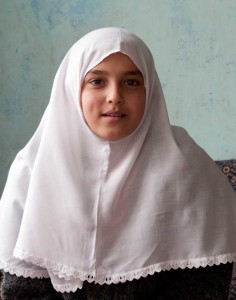
And Sakina, an 80 year old “internally displaced person”, (IDP) who returned to Kabul from a refugee camp in Pakistan. Her family couldn’t afford a house, so she now lives in an informal camp inside the city. I marvel at the determination in her face and the sparkle in her eyes.
In spite of her lifelong poverty and struggles with living in uncomfortable conditions and severe winter cold at her advanced age, she is still an active member of her family and complains that people don’t want to hire her to clean their houses because they think she’s too old.
To book the exhibit and/or presentation(s), email me at peggy@kelseys.net
Posted in Afghan Women's Project, AWP 2010, psychological health, refugees, women | Comments Off on
Depression
Sunday, August 22nd, 2010
Posted in AWP 2010, Other, psychological health, Uncategorized, women | 2 Comments »
Commentary on the Aisha NY Times Article
Sunday, August 8th, 2010
Often glossed over in the story of Aisha, the beautiful 18-year-old woman who was disfigured as retribution for running away from her inhuman marriage, was that although it was a Taliban commander who ordered her horrific punishment, it was her husband (also a Taliban commander) who held her down.
This sort of human rights abuse has been going on since pre-history in the form of “blood debt”, a sacrificial attempt at holding the fabric of society together. To redress an offense, the family of the perpetrator gives a child in marriage to the wronged family. In Aisha’s case, she was married off to atone for her uncle having killed of one of her husband’s relatives. These unfortunate women are generally treated as slaves and subject to all kinds of abuse from their husbands, mothers-in-law and other family members.
The perpetrators of this crime against human rights were Taliban, but it didn’t happen because they were Taliban. As with honor killings, the custom of murdering women for destroying the perceived honor of their family, whether proven or only suspected, the blood debt is a means of restoring honor to the family and stability to the society at large. The father and/or brothers who carry it out are following the age-old customs of their culture. Even completely eradicating the Taliban wouldn’t put an end to the brutality of these practices.
Rather, the way to improve human rights in the long run is through rural education in areas such as the village Aisha came from. It’s great that a large number of foreign NGOs are currently working in Afghanistan, some even in remote provinces, to promote education and build schools. As crucial as it is to educate girls, transforming society through human rights education is also important for boys who will grow up to be the ones in control.
However, the best, most sustainable way for this to happen is via Afghan NGOs. Not only are they mostly more cost effective, but they are more likely to be accepted by local people and to weather the changes coming forth in the next few years. We can participate in this by supporting such organizations as The Afghan Institute of Learning (AIL), an NGO founded by Sakina Yacoobi steming from her work in the Afghan refugee camps in Pakistan. AIL’s curriculum, based on the Koran, teaches about women’s and human rights in addition to academics. They spread their work exponentially by training teachers in modern teaching methods and by focusing on opening schools in the rural areas where they are invited. (They have more requests than they can handle and more contributions can help them reach farther.) You can contribute to their work via their American partner, Creating Hope International.
Posted in Afghan Women's Project, Aisha, AWP 2010, education, political, Taliban, women | Comments Off on Commentary on the Aisha NY Times Article
Bamiyan Province, Part 3
Saturday, July 17th, 2010
About 15km east of Bamiyan along the Silk Road lie the ruins of the ancient city of Zohak. Made entirely of red-mud bricks, it is also known as The Red City. Sitting atop a 350′ cliff of of red rocks overlooking the confluence of the Bamiyan and Kalu rivers, it guards the Eastern entrance of the long narrow Bamiyan Valley.
One would think that just being up so high would be defense enough, but in addition along the steep path were various guard towers and finally a tunnel one must pass through to reach the top.
Although the present remains were built in the 12th century by the Shansabani Kings, there is also evidence that during the time of the Hephthalite Huns in the 6th century, there was already a massive complex here. In fact, I saw pottery shards from the Kushan Dynasty period, which was dominant in this area during the 1st-4th centuries. In modern times, it became a Mujahidin stronghold during the war against the Soviets. At its peak, 3000 people resided here.
The story of how the city got its name was best told by Nancy Hatch Dupree:
“Zohak first appears in the Shahnama as a noble prince of Arabia, a devoted son well-beloved by his people. He became, however, possessed of the Devil who induced him to usurp his father’s throne whereupon the Devil appeared disguised as a loyal subject who asked to kiss the new king on the shoulders in token of his complete submission. No sooner had he done so, and vanished, than two black serpents thrust their heads out from where the kisses had been placed. Attempts to cut them off only resulted in their immediate return and their increased demand for human brains, the only food they would accept.
At the same time that Zohak was being seduced by the Devil, civil war broke out in Iran and Zohak marched in as the champion of one faction and was enthroned as the emperor of Iran. For a thousand years his rule brought terror and chaos to the land, but then the hero Fraidun was born. After many escapades, Fraidun finally succeeded in taking Zohak prisoner whereupon he took the dragon-king to a far off mountain peak and left him there to die. The Shahnama ends the tale here but, typically, Afghan legend goes on to elaborate by saying that, deprived of their daily meal of brains, the serpents turned on Zohak, bit into his scalp and fed upon his brains until he died.”
My guide told me that people believe that this city with its fertile valleys was the royal abode of Zohak.
I’ve read that in 1222, Genghis Khan sent his favorite grandson to deal with the Shansabani kings who responded by slaying the young general. As revenge, Genghis sent his warriors to storm the citadels. Every living thing in the valley was slaughtered. My guide told me that this actually happened in Gogola, The City of Screams which overlooks the Buddha site in Bamiyan.
Posted in Afghan Women's Project, archeology, AWP 2010, environment, Other | 1 Comment »
The Peace Jirga
Friday, April 23rd, 2010
The London Conference, which took place in January of this year to chart a new course for the future of Afghanistan, established a Council Circle (jirga) about Peace, scheduled to take place in early May. (It’s since been postponed to the end of the month.) Fifteen hundred of Afghanistan’s tribal elders and other community leaders are to be brought together (paid for by the UN) to create a formula upon which peace can be built. In order to establish meaningful peace, all parties would need to be involved, including militants of different varieties.
The reaction of the Afghan Women’s Network was to host an Afghan Women’s Forum on April 3rd where influential women from all over the country came together to discuss the participation of women in the Peace Jirga. There were lots of nice speeches but in the Q&A afterwards, when asked how women should be included, one male panel member suggested that women select one representative to be present at the Peace Jirga to let the participants know what women think. This, of course was shot down by the audience, and in the end, he agreed that 30% of the attendees to the jirga should be women. What else could he say? He was only a representative for the minister who hadn’t attended. If he truly supports significant female involvement, he will have to push for it. Otherwise, he could let it sit on the back burner and nothing would come of it while he could still claim to be “supportive”. The position of the Forum was that women should also be substantially involved in each of the “clusters” (of ministries) which would lay the groundwork for the jirga.
Vic Getz,(1) who has been involved in Afghanistan for five years and living here for three has this to say about the Peace Jirga:
“If these media photo ops are happening at taxpayer (I mean around the world) expense, then we must create mechanisms to invest in parallel conferences that provide alternative points of view. …to be constrained by the powers that invest (??) in Afghanistan is unacceptable. Fund the Parallel Peace Jirga….start it now. Where is the money for these kinds of initiatives? Where is the support? – Because I KNOW, that the people, ideas, intelligence, understanding (far more nuanced than you could ever believe), networks and energy are here. Now. Today.
If I had the money, I would fund it myself – just to show the world the Afghanistan that I know exists here. Now that’s a photo op I could believe in.”
I’ve been asking my interviewees their opinion of “negotiating with the Taliban”. The responses seem to be divided into two classes. The “normal people” (both those who left and those who suffered under the Taliban) have mostly said that you can’t trust them, that they are all against education for girls and that if they are allowed into the government, the situation will return to what it was before. The women who are members of Parliament or leaders of some women’s groups say that if Talib individuals are to become part of the government, then they must abide by the rules of the constitution in which women’s rights are clearly stipulated. And so they think that it’s not a bad idea and that it might have a chance of bringing peace.
One mistake that I see in this discussion is the assumption that all Talibs are the same and that they are unchangeable. Even under their previous rule, there were different strains of them under different leaders. Some were more ideologically motivated, others were members because they needed the pay, others because they were supported by Pakistan. Now there is also talk of them having changed their tune a bit. Mullah Omar released a statement last fall saying that “the Taliban do not oppose women’s rights and favor education for all”.
Tajwar Kakar told me this story when I interviewed her in 2003 talking about the time when she was headmistress of a school for boys in 2000 under the Taliban.
“The next day the religious police came to my office and I asked them what they want. They said that they heard that I have one room where you put pictures. I opened the door and showed them the two walls of pictures, one group of pictures of the city before the war and the other of the destroyed city. Look, I said, who destroyed our country? Who made you poor? Who made you uneducated? Before the war, you had a good life and there were nice buildings. Now it is not your responsibility to take your stick and punish the woman. Now you should build up your country. I put these pictures to put in their minds who destroyed their country and what it is their responsibility to do.… What are you doing now? Have you come to punish me? He said ‘you did nothing wrong’. How old are you ? ‘We’re 18, 19 and 20.’ How will you rebuild Afghanistan? With this stick you have? Islam doesn’t teach you to punish the women. Then one asked: ‘Is it possible for us to come every day for a half hour and you will teach us?’ They had come to punish me. But that was my work.”
Hanifa Safia, the women’s-affairs representative for the province of Laghman, says that she thinks “a settlement is the only way to peace. The Taliban fighters who throw acid on schoolgirls’ faces or threaten professional women do so just to antagonize the government. I have talked to so many Taliban. They are not against women,” Safia said. “Once they have been given positions in government, they will definitely change.” (2)
On the other hand, Hekmatyar’s organization, Hezb-e-Islami, the second largest insurgent group, is calling for the replacement of the current Afghan parliament with an interim government which would, after new elections, rewrite the constitution. Scary.
As far as women being forced to stay home and being denied education and human rights, the biggest factor is the families. Now, at a time when the government gives women all of these things, many fathers, husbands, brothers and even sons deny them to their women. It is important to have the legal rights and educational opportunities, but the real work of social change must happen on an individual level and must be seen from a generational perspective.
One powerful force (especially in Afghanistan) in this endeavor is Islam. The rights for all of these are given in the Koran. Already much progress is being made through education, basing the good treatment, respect, education and involvement of women in society on Islamic scriptures.
1 Vic Getz,PhD, is an Environmental Sociologist/Gender and Development Specialist and founder of the Afghan Gender Cafe (UPGRADE coming soon)
To join the AWRL (Afghan Women’s Rights List) network, email Vic at vgetz@moscow.com
2 By Karin Brulliard The Washington Post
Posted in Afghan Women's Project, AWP 2010, education, Other, political | 1 Comment »
Afghan Women Writers
Friday, April 16th, 2010
The Afghan Women’s Writing Project offers a way to support Afghan women emerging writers in a delightful, eye-opening and very meaningful way.
Novelist Masha Hamilton began this project to give voice to Afghan women. The deteriorating opportunities for women from her first visit in 2004 until her return in 2008, inspired her to create a project where women could share their thoughts from the safety of their own homes, unfiltered by family members or the media.
Women who join the project are mentored, via back and forth emails, as they polish the writing of their experiences. Many of them participate in secret. Their mentors, female authors and teachers, volunteer on a rotating basis. Writing workshops are taught in online classrooms.
I have met and interviewed several women in this project and will be sharing some of their life stories in my presentations upon my return. Some of the most promising of these writers have told me that they came to believe in their writing abilities due to the supportive comments left by readers on the pages of the website. These poems, short stories and essays provide a window into the lives of Afghan women that we would not have otherwise.
For example, one woman writes:
Let the world know
I am a poem.
My soul is crazy.
no matter what happens next,
no matter if no one reads the verse of my mad thoughts,
no matter if dust covers my poetry papers,
I am a poem.
I write about the waves of my soul’s water.
My poem tastes like a glass of black tea
when you are tired.
It is the spice of my lunch every day.
My poem sounds like the sky singing in summer,
like rain in the spring.
My poem sounds like
parrots talking, sparrows chatting
in a lonely tree in the valley.
I bloom, bloom, bloom.
When I write about mirrors
pain, life, tea, sparrows, eyes,
I write, write, write.
No matter that, in her hands, Nature
has a hammer, leveled
at my head, poised to kill my poem.
I don’t give up.
I am a poem.
By Roya
And another:
While the schools Burn
“I am burning,”
says the school.
“Who will save me?”
cries the school.
“Where are my students,
the teachers, our friends?”
“Why do the Taliban burn me?”
They are not literate.
Students fear.
Teachers receive threats,
get kidnapped, beheaded.
Friends, families fear.
Unread books are sad.
They too, burned
by guns that write with fire.
Knowledge, understanding
grieve.
Is there anyone
any organization
any country
any international society
who will help us overcome our loss,
this war,
our Afghanistan?
We wait, hope, want.
Please, help us
invite the return of knowledge.
By Freshta
Below is an excerpt from an essay written by a woman returning to her home in Mazar Sharif:
Who Will Stop The Crimes?
…After leaving Fatema’s house, I saw a small girl trying to clean a car. People on the street were laughing at her. I thought: Why is she on the street? Why isn’t she studying instead? How can I take them out of the darkness? I know I alone can’t do anything, but we as a people must start anew. We should never let any girl be a victim of her family. We must give women the courage to let their voices be loud and to know their value. We must not ignore women when they talk about their rights.
Who will stop these crimes against women? Who will hear our voices? Who will hold our hands and take us out of the darkness? Who can hear the meaning of our tears? Who will bring peace to those who are begging on the streets?
For all the questions, I have one answer—unity. Our country is one of the poorest in the world because women live like slaves and do not participate in society. We as a people have forgotten to value each other as human beings. We are all equal. It is our combined hands that can destroy or build our country. If we do not try, nobody will help us.
By Shogofa
And another excerpt from
The Blaming Game
…Now my heart wants to shout directly into the ears of my people: “For Allah’s sake, stop blaming others for our miseries and problems.” I want to reach out to millions of Afghans, President Karzai included, and tell them: “We have had enough of the blaming game. Let’s not play it anymore. Let’s take responsibility for our own actions and our own faith, for our people cannot take any more pain of dirty politics and lies.
By Meena
You can help by commenting on the writings and donating money for flash drives and netbook computers. Your generosity can help open prison doors.
Posted in Afghan Women's Project, AWP 2010, education, Other, writers | Comments Off on Afghan Women Writers
